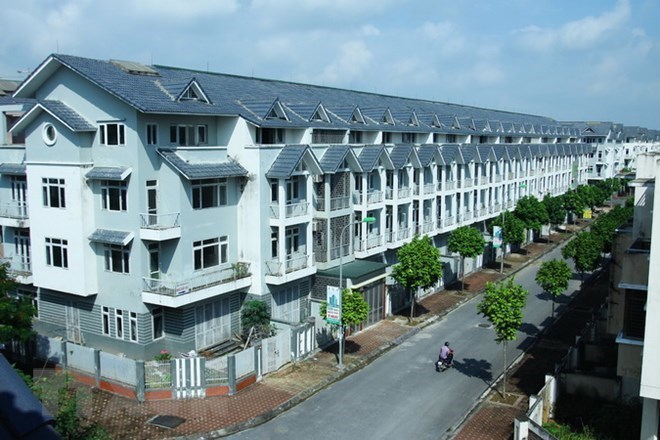Property companies look beyond banks for funds
Amid widespread expectations that the central bank will continue to pursue its tight credit policy, especially to risky areas like real estate, in 2019 property developers are looking at other sources for funds.
 |
| Illustrative image (Photo: VNA) |
Developers in Viet Nam traditionally relied on two main sources for funding: loans from banks and money from their customers.
However, now they are only allowed to take payments from customers when their project is between 30 and 50% finished.
This means bank credit represents the most important source.
But from 1 January next year banks will be allowed to use only 40% of their short-term funds for medium- and long-term loans, down from the current 45%.
Developers are turning to the securities and bond markets, foreign investment and mergers and acquisitions.
Analysts prefer the latter two considering what happened in the real estate market this year.
According to the Foreign Investment Agency (FIA), in 2018 FDI flowing into real estate projects was worth over 6.5 billion USD, with the biggest investor being Japanese heavyweight Sumitomo Corporation.
In May a Vietnamese-Japanese consortium consisting of four Vietnamese enterprises led by BRG and Sumitomo set up a joint venture to develop the Nhat Tan-Noi Bai smart city project with a total investment of 4.2 billion USD.
FIA officials also said that the real estate market was likely to attract huge investments from Japan, the Republic of Korea and Singapore in the coming years.
The Japan External Trade Organization (JETRO) said around 1,000 Japanese companies were likely to invest in Vietnam in the next decade, many in the property sector.
Tran Lam Binh, operations director of IMM Group, said his company had received 20 offers from developers from Japan, the Republic of Korea, Malaysia, and Hong Kong to invest between 10 million USD and 100 million USD to build apartments, officetels and hotels.
FDI in real estate is indeed rising, and investors are interested in a range of products from housing and industrial property to office buildings and tourism.
Many foreign investors are ready to enter into joint ventures with reputed Vietnamese developers or invest in projects through mergers and acquisitions.
This year there has been an M & A boom involving Vietnamese and foreign companies, many of them large deals, the first sign that property companies are looking at other sources of funds besides bank loans.
Japan’s Global Group ties up with Nha Mo Company to develop the Dream Home Riverside. The Joint Venture between Tien Phat and Japan’s Sanyo Homes Corporation developed Ascent Lakeside project at a cost of 30 million USD. Japan’s Mikazuki invested 100 million USD in the Bamboo Capital Complex.
A report from Savills said property remained an attractive proposition for developers interested in mixed-use projects with residential components in major cities.
CapitaLand, for instance, acquired a 0.9ha site in a prime location in Ha Noi’s Tay Ho district in March. This will expand CapitaLand’s portfolio to 12 residential developments, one integrated development, and 21 serviced residences in six cities in Viet Nam.
Another Singaporean developer, Keppel Land, acquired the remaining 10 percent stake in Jencity Limited, which has plans to build a township - Saigon Sports City - for 11.4 million USD.
Investors are also seeking to acquire sites and properties in the hospitality sector amid increasing consumer demand and surging international arrivals. In January Japan’s Mikazuki Hotel Group announced plans to invest 100 million USD in a project in Da Nang to accommodate a five-star hotel, a waterpark, a theme park, and an F&B complex fronting the beach.
Vietnamese investment company Bamboo Capital acquired the Malibu resort for some 14.8 million USD from Indochina Hoi An Beach Villas Co., Ltd.
The securities market is also expected to help mobilise funds for real estate enterprises especially after Vietnam was added to a watch list for possible reclassification as a secondary emerging market by FTSE Russell.
In recent times, more and more real estate companies have listed their shares on the market and raised funds. The number used to be very small, but began to increase in 2017 and accelerated this year with many famous real estate companies listing.
They include Van Phu-Invest Joint Stock Company, CEN Land, Everland, and Kosy.
Market observers said this trend would continue in 2019 and into the future.
(Source: VNS/VNA)